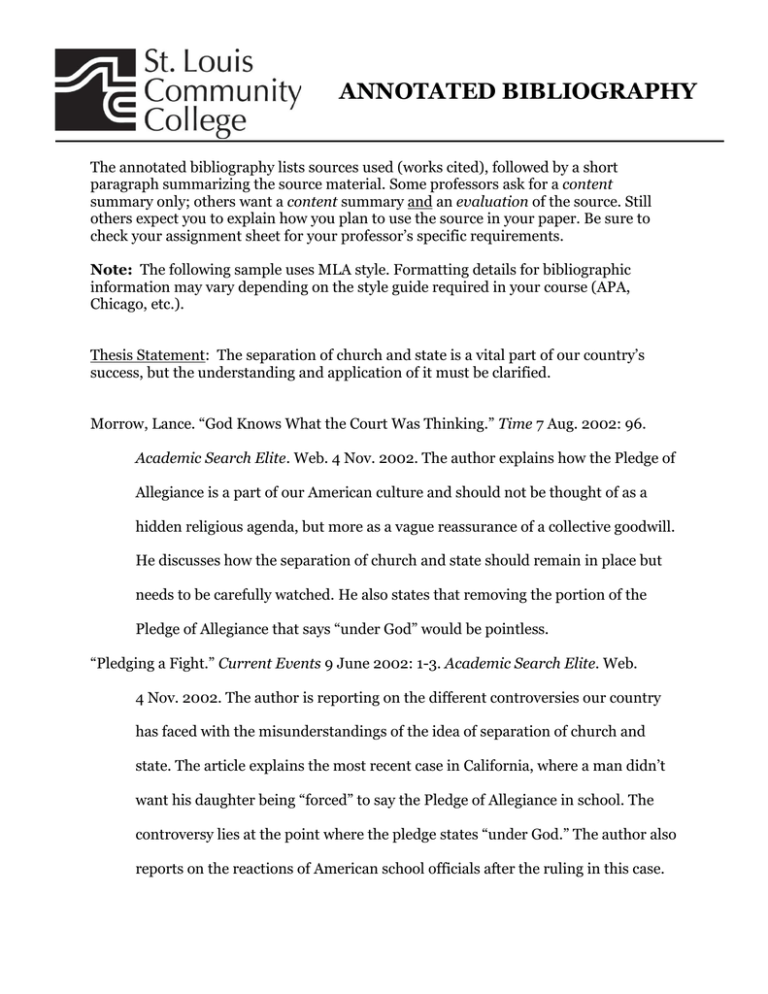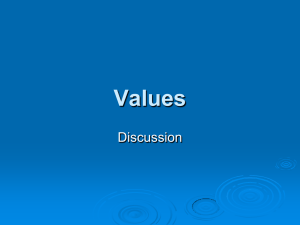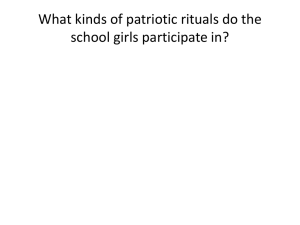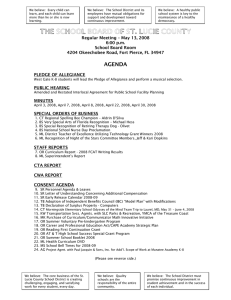ANNOTATED BIBLIOGRAPHY
advertisement

ANNOTATED BIBLIOGRAPHY The annotated bibliography lists sources used (works cited), followed by a short paragraph summarizing the source material. Some professors ask for a content summary only; others want a content summary and an evaluation of the source. Still others expect you to explain how you plan to use the source in your paper. Be sure to check your assignment sheet for your professor’s specific requirements. Note: The following sample uses MLA style. Formatting details for bibliographic information may vary depending on the style guide required in your course (APA, Chicago, etc.). Thesis Statement: The separation of church and state is a vital part of our country’s success, but the understanding and application of it must be clarified. Morrow, Lance. “God Knows What the Court Was Thinking.” Time 7 Aug. 2002: 96. Academic Search Elite. Web. 4 Nov. 2002. The author explains how the Pledge of Allegiance is a part of our American culture and should not be thought of as a hidden religious agenda, but more as a vague reassurance of a collective goodwill. He discusses how the separation of church and state should remain in place but needs to be carefully watched. He also states that removing the portion of the Pledge of Allegiance that says “under God” would be pointless. “Pledging a Fight.” Current Events 9 June 2002: 1-3. Academic Search Elite. Web. 4 Nov. 2002. The author is reporting on the different controversies our country has faced with the misunderstandings of the idea of separation of church and state. The article explains the most recent case in California, where a man didn’t want his daughter being “forced” to say the Pledge of Allegiance in school. The controversy lies at the point where the pledge states “under God.” The author also reports on the reactions of American school officials after the ruling in this case. Schuck, Peter H. “The Pledge on the Edge: Reciting the Pledge of Allegiance Might Offend Some, but Let’s Not Make a Federal Case Out of It.” American Lawyer 24.9 (Sept. 2002): 65-69. General Reference Center. Web. 4 Nov. 2002. The writer suggests that we should oppose the recent court rulings dealing with the Pledge of Allegiance but only for the right reasons. The people who do not wish to say those two words (“under God”) should opt out. The writer suggests that causing an issue over such a minute detail is ridiculous. Being of Jewish descent, he never felt out of place by not saying those two little words. The writer claims that standing up for your beliefs in the public eye helps to build character. He also states that the pledge honors liberty and justice for all, not just those who share our beliefs. (Many thanks to Matt LaPlant, an ENG 102 student at Meramec, who granted us permission to use his work in this handout.) This document was developed by the College Writing Center STLCC-Meramec Revised 2013



